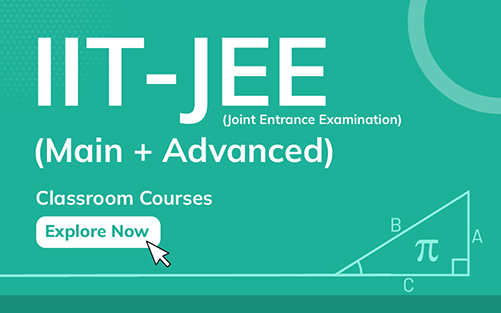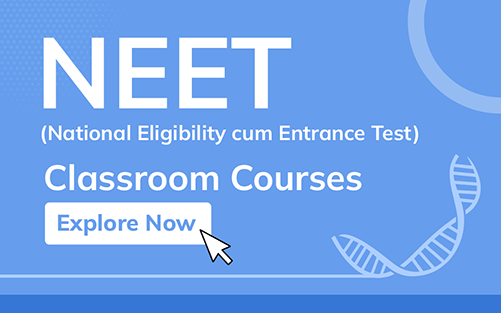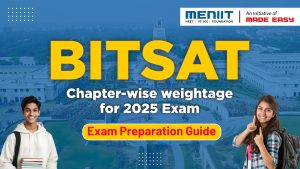Perfect NEET Study Plan for 8th to 12th Pass Students

One must have a realistic plan to move each step forward in the right direction.
Before starting NEET preparation, planning carefully to ensure a result-oriented preparation is important. NEET aspirants must adhere to a realistic study plan and timetable for NEET preparation, including persistent attention, dedication, and self-discipline. Over the past few years, there has been a gradual rise in competition, making it crucial for aspirants to start their NEET preparation early with a well-structured and efficient study plan.
Now a frequent question arises in students’ minds: what is the best study plan for NEET preparation? To encourage and guide students studying in classes 8th to 12th, we have come up with a result-driven and proven study plan for NEET. That caters to meet the needs of students studying in different classes. It will ensure that students can utilise their precious time to strengthen their fundamentals for NEET.
In this blog post, we will share a perfect study plan for NEET, highlighting the NEET timetable, and preparation tips to guide students in ensuring effective preparation. We will discuss every aspect of the NEET preparation.
Core Essentials of NEET Preparation
Before starting preparation, it is important to note that covering both the 11th and 12th is necessary for comprehensive NEET preparation. To ensure an effective and result-driven preparation, students must impart these essentials. Here are a few core essentials of NEET preparation:
- Understanding of NEET Syllabus: A thorough understanding of the syllabus is required to succeed in NEET. Aspirants should carefully go through the latest NEET syllabus. The syllabus is the ultimate guide to continue preparation in the right direction.
- Effective Study Plan for NEET: Having a structured plan for preparation is important in NEET preparation. Adhere to the preparation schedule regularly. Seek guidance from experienced NEET faculties to ensure more comprehensive and organised preparation.
- Consistency: Consistency plays a crucial role in NEET preparation. So, to maintain decorum in the preparation, aspirants must adhere to the study plan and maintain consistency throughout the preparation.
- Optimum Self-Study: If you have joined a coaching institute, then along with coaching 6 hours of optimum self-study is required to ensure comprehensive coverage of the syllabus, effective revision and adequate NEET-level question practice.
- Crisp and Comprehensive Notes: Note-making is an essential part of preparation. Students should make their handwritten notes. It will be helpful in the efficient revision of the NEET syllabus.
Art of Note Making for NEET
It is important to note that notes should be crisp and comprehensive. While making notes for NEET, simplify complex concepts into easy-to-understand language. Use flowcharts, diagrams, and mnemonics to make it more comprehensive and crisp. Make a list of concepts, formulas, and equations that are complex to understand and remember. Revise them periodically to recall them easily.
- Effective Revision: Revision is essential for retaining a vast array of information, concepts and formulas for a long time. It should be prioritised in the preparation. Frequent and effective revisions are crucial to ensure good preparation. Revise effectively using active recall techniques.
- Effective Revision Using Active Recall Techniques: The active recall method is a scientifically proven and most efficient way to recall anything quickly. When you actively stimulate your memory for any information. Active recall is a much more powerful way to teach your brain to remember difficult concepts. It is more efficient than passive study techniques like reading and highlighting texts in notes and books.
Active Recall 3Rs Rule
- Review: Go through the concepts written in notes or textbooks and review carefully what you have studied. At the end consolidates what you learned.
- Recall: Try to recall the concepts and analyse how much you can recall without looking at your reference materials.
- Repeat: Repeat the same steps again and again. It will help you recall the information for a longer time.
NEET PYQs Practice: PYQs play an important role in ensuring preparation in the right direction. Students should solve previous years’ questions to get familiar with the exam pattern and types of questions. It allows students to identify their strengths and weaknesses.
NEET Simulated Testing: At the end, testing performance gives you an analysis of the preparation level. Students should include testing in their preparation, like MCQs practice, Topic Wise PYQ modules and Daily Practice Problems (DPP). After completing a good portion of the syllabus, students can attempt sectional and full-length tests to assess their preparation level and figure out the scope for improvements.
NCERT Textbooks: NCERT lays down a solid foundation so, students must read NCERT textbooks, especially for Biology and Inorganic Chemistry because most of the questions asked in the exam are based on the concepts mentioned in the NCERT textbooks.
Here is the effective timetable and study plan for NEET 2025, which caters to meeting all the essentials in ensuring a full-fledged and comprehensive NEET preparation.
NEET Study Plan for 12th Pass Students
Preparation in class 12th is all about consolidating knowledge and enriching exam preparation with effective practice and revision.
Preparation Tips for 12th Pass NEET aspirants
- Revise Effectively: Focus on a thorough and effective revision of class 11th topics alongside the class 12th syllabus. Frequent revision helps in retaining information for a long time.
- Effective Time Management: The NEET exam demands a high concentration of 3 hours during the exam so it would be better to ensure at least 2 hours of study at a time without a break. Aspirants can follow Pomodoro techniques to manage their time efficiently. Utilise your time smartly and analyse your preparation level at the end of each month with the help of NEET mentors.
What is POMODORO?
Pomodoro is a time management technique. It involves breaking the tasks into short intervals, each interval is separated by a short break. Each interval is called Pomodoro.
- Quality Study Materials: Choose quality study materials, stick to them, and revise multiple times instead of choosing different resources.
- Mock tests: Attempt mock tests to access the preparation level and simulate the actual exam environment.
- NEET Coaching and Guidance: Coaching can make NEET preparation more structured and result-oriented. Seek guidance from NEET experienced faculties and join classroom courses for NEET. It would be a winning step to prepare under the guidance of experienced mentors.
NEET Preparation Timetable for 12th Pass Students
| Time | Monday | Tuesday | Wednesday | Thursday | Friday | Saturday |
|---|---|---|---|---|---|---|
| 08:00 AM-10:00 AM | Physics | Question practice (inorganic chemistry) | Question practice (organic chemistry) | Physics | Physical chemistry | Inorganic chemistry |
| 10:00 AM-10:30 AM | Break | Break | Break | Break | Break | Break |
| 10:30 AM-12:30 PM | Botany | Physics | Zoology | Organic chemistry | Botany | Zoology |
| 12:30 PM-01:00 PM | Break | Break | Break | Break | Break | Break |
| 01:00 PM-03:00 PM | Physical chemistry | Organic chemistry | Physical chemistry | Physics pyqs | Physical chemistry pyqs | Organic pyqs |
| 03:00 PM-04:00 PM | Break | Break | Break | Break | Break | Break |
| 04:00 PM-06:00 PM | Question practice (physics) | Question practice (botany) | Question practice (zoology) | Zoology revision | Physics revision | Botany revision |
| 06:00 PM-07:30 PM | Break | Break | Break | Break | Break | Break |
| 07:30 PM-08:30 PM | Botany revision | Organic chemistry revision | Physical chemistry revision | Inorganic revision | Organic chemistry revision | Physics revision |
| 08:30 PM-09:30 PM | Dinner | Dinner | Dinner | Dinner | Dinner | Dinner |
| 09:30 PM-11:30 PM | Question practice (physical chemistry) | Question practice (physics) | Question practice (physical chemistry) | Physical chemistry revision | Physics | Physics |
| 11:30 PM-01:00 AM | Inorganic chemistry | Organic chemistry | Botany | Zoology pyqs | Botany pyqs | Physics pyqs |
NEET Study Plan for 11th and 12th Students
Students studying in classes 11th and 12th need to understand the importance of covering the 11th and 12th syllabi comprehensively. It helps in building a foundation for NEET. So students should carefully study not only to just score good marks but also to hold a decent conceptual understanding of subjects.
NEET Preparation Tips for 11th and 12th students
Importance of NCERT textbooks in NEET Preparation
NCERT textbooks play an important role in ensuring a clear understanding of topics mentioned in the NEET syllabus. The textbook is interpreted decently and explains the topics with suitable examples and diagrams so that students can easily understand. Students should read NCERT textbooks thoroughly as it helps to build a good understanding of the subject matter. Every year NCERT-based questions are asked in the NEET exam.
Build Good Time Management Skills
It is the golden time for students to learn efficient time management. Develop a habit of reading books, and solving questions within a certain time limit. It enables students to improve problem-solving speed and accuracy.
NEET Timetable for 11th and 12th Students
| Time | Monday | Tuesday | Wednesday | Thursday | Friday | Saturday |
|---|---|---|---|---|---|---|
| 07:00 AM-09:00 AM | Physics | Organic chemistry | Biology | Physics | Physical chemistry | Inorganic chemistry |
| 09:00 AM-03:00 PM | Coaching/ school | Coaching/ school | Coaching/ school | Coaching/ school | Coaching/ school | Coaching/ school |
| 04:00 AM-06:00 PM | Biology | Physics | Inorganic chemistry | Organic chemistry | Biology | Question practice (physics) |
| 06:00 PM-08:00 PM | Physical chemistry | Question practice (biology) | Question practice (organic) | Chemistry pyqs | Physics pyqs | Question practice (physical chemistry) |
| 08:00 PM-09:00 PM | Dinner | Dinner | Dinner | Dinner | Dinner | Dinner |
| 09:00 PM-10:00 PM | Question practice (physics) | Ncert textbooks | Biology pyqs | Question practice (biology) | Question practice (inorganic chemistry) | Ncert based questions |
| 10:00 PM-11:00 PM | Question practice (physical chemistry) | Question practice (physics) | Ncert textbooks | Inorganic chemistry revision | Organic chemistry revision | Physics revision |
| 11:15 PM-12:00 PM | Biology revision | Organic chemistry revision | Biology revision | Physics revision | Physics | Formulas/ equations revision |
NOTE: Due to any reason, if you fail to follow the timetable during weekdays, use the weekend to catch up on pending tasks.
NEET Study Plan for 8th, 9th and 10th Students
Starting NEET preparation in classes 8 to 10th might seem early, but it’s a strategic move. At this stage, focusing on building a strong foundation in science is crucial for understanding advanced concepts later on.
Given its competitive nature, starting early preparation can provide substantial advantages. It enables students to learn effective time management skills, and discipline and maintain consistency in their study, which will help students in 11th and 12th standard to prepare for NEET with ease.
It enables students to learn effective time management skills, discipline and maintain consistency in the study which will help students in 11th and 12th standard to prepare for NEET with ease.
Build these habits before starting to prepare for NEET
Here are some tasks that students should execute at the beginning of the preparation.
- Start a habit of studying regularly
- Read NCERT science textbooks for classes 6th, 7th and 8th
- After reading, think about the application part of concepts.
- Practice NCERT Based MCQs
- Analyse question-solving speed and accuracy.
- Figure out mistakes and build a habit of reading questions carefully.
Preparation Tips for 8th, 9th and 10th Pass Students
- Read NCERT Science Textbooks (6th to 10th): Make sure you read textbooks to understand the theory and concepts and, not just for fetching marks in the exams. Every student should adopt this practice from a very young age.
- Solve NCERT-based MCQs: Solve MCQs by carefully reading and analyzing the question wording. Instead of guessing the options, recall and apply previously learned concepts to solve the questions.
- Join NEET Foundation Classroom Courses: Enroll in Foundation Courses to build a strong foundation. Opting for foundation programs for NEET preparation can be a fruitful choice.
Advantages of starting NEET preparation earlier
Here are some proven benefits of starting NEET preparation earlier.
Strong Foundation for NEET: A strong fundamental knowledge will help to grasp more complex topics in higher classes with ease.
Improve Time Management Skills: NEET preparation requires students to stick to a set schedule, enhancing their ability to manage and utilise time effectively.
NEET Preparation: Timetable for 8th 9th and 10th Students
Here is an effective self study time table for NEET preparation:
| Time | Monday | Tuesday | Wednesday | Thursday | Friday | Saturday |
|---|---|---|---|---|---|---|
| 07:00 AM- 02:00 PM | School | School | School | School | School | School |
| 04:00 PM- 05:30 PM | Science | NCERT textbooks | Mathematics | Science | Science |
NCERT based mcqs |
| 05:30 PM- 07:30 PM | Break | Break | Break | Break | Break | Break |
| 07:30 PM- 08:30 PM | Mathematics | Question practice (mathematics) | Science revision | Question practice (science) | Science revision | Formulas / equations revision |
| 08:30 PM- 09:30 PM | Dinner | Dinner | Dinner | Dinner | Dinner | Dinner |
| 09:30 PM- 10:30 PM | Homework | Homework | Homework | Homework | Homework | Homework |
NOTE: Due to any reason, if you fail to follow the timetable during weekdays, use the weekend to catch up on pending tasks.
Conclusion
NEET preparation demands dedication, discipline and guidance to ensure good preparation. Aspirants should utilise at least 70% of extra time (other than coaching) in the study. Following a structured approach can significantly enhance the chances of success in NEET. With the right resources and mentorship, one can excel in the NEET exam with good scores. At MENIIT, we are committed to providing comprehensive guidance and support to help NEET aspirants in ensuring a full-fledged and result-driven preparation.
In the upcoming blog, we will come up with a result-oriented and comprehensive study plan for NEET 2025.
Frequently Asked Questions (FAQs)
How to get 720 in NEET 2025?
Scoring 720 in NEET is challenging, yet achievable with the right strategy and comprehensive preparation. In NEET 2024, multiple candidates scored 720 marks and secured AIR 1 with the same score. This shows that with the right guidance and effective preparation, one can score 720 in NEET 2025. Here are some effective tips to get 720 in NEET 2025.
- Complete the entire NEET syllabus.
- Build a strong grasp of the subjects.
- Practice quality questions and strengthen problem-solving skills.
- Solve and analyse NEET PYQs.
- Attempt NEET simulated mock tests.
- Identify mistakes and rectify them before the actual NEET exam.
- Improve speed and accuracy.
How many hours should I study to get a good result?
Typically, studying for 6 to 8 hours (excluding coaching) is enough to cover the entire syllabus, thorough revision and practice an ample number of questions, which may ensure an excellent result in the exam.
How can I avoid distractions during NEET preparations?
The NEET exam requires constant attention and focus. Keeping a rigorous study plan may exhaust hopefuls. As a result, students get distracted. NEET aspirants should follow these effective techniques to avoid distractions during preparation.
- Avoid Social Media & Smart Phones
- Maintain consistency in the study routine
- Get adequate 6-8 hours of sleep
- Practice meditation and Yoga
- Talk to mentor & Family members
Which study time is best for NEET?
It completely depends on the students. Ideally, studying in the morning is efficient. However, students can study anytime when they are active and want to study.
















